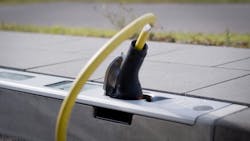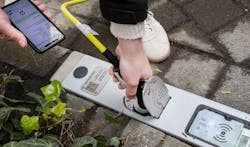Curbside EV Charging Successful in German Field Trial
Lack of electric-vehicle charging infrastructure has slowed the growth of EV use and sales. To address this problem, Germany’s Rheinmetall has developed an alternative to the tall, conventional EV charging stations currently on the market.
The Rheinmetall Curb Charger is a compact unit integrated directly into the sidewalk. It thereby solves the problem of limited space in both urban and rural areas and enables an easily expandable network of publicly accessible charging points. The charger features up to 22 kW of charging power via a Type 2 EV charging connector (see figure).
Equipped with standardized interfaces, an integrated 4G modem, and Ethernet, the Curb Charger facilitates the exchange of data between the charger and backend systems using the OCCP 1.6 communication standard.
OCCP 1.6 makes it possible for EV charging stations to interact with central management systems. It permits the sharing of real-time information on charging sessions, customer reservations, and the status of charging points, along with the ability to perform over-the-air software updates.
Reliability in Harsh Weather Conditions
Built-in cooling enables reliable operation at high outside temperatures and prevents overheating; integrated temperature monitoring ensures peak charging performance. Similarly, at sub-zero temperatures, a built-in heating system ensures visibility and reliable snow- and ice-free operation.
Encapsulated electronic components (IP68, which means a device is both dust-tight and resistant to prolonged submersion in water beyond one meter) and a charging socket equipped with seals and water drains further enable reliable charging even in the rain. If water accumulates on the street and compromises a safe charging process, a water level sensor interrupts the process before triggering the residual current device—an electrical safety device that automatically cuts off power when it detects a leakage of current to ground.
In the event of electrical faults, the integrated surge protection offers additional safety for people, electrical cars and connected systems.
Trial Run for the Curb Chargers
After just over a year, the City of Cologne Germany, TankE GmbH (a developer of IT backend systems for charging infrastructure based in Cologne) and Rheinmetall AG concluded a joint field trial of four Curb Chargers in the public road space.
The pilot project was started in April 2024 at two locations in Cologne-Lindenthal. The aim was to validate the practical suitability, urban planning, and design advantages of Curb Charger, as well as the acceptance of the innovative charging solution over a period of 12 months.
The case study demonstrated that the Curb Charger is ready for the market. The field trial included a total of more than 50 MWh of energy charged—an average of around 19 kWh per cycle, which corresponds to a range of approximately 120 kilometers.
Christoph Müller, CEO of Rheinmetall’s Power Systems division, said, “Our product integrates the charger electronics into a standard Kerbstone (stet) to enable the charging of electric vehicles directly at the roadside.”
“Curbing” Operating Costs
The compact, modular design allows for quick and easy maintenance by replacing the charging module inside the curb. This has resulted in almost continuous availability of more than 99% at what’s said to be low operating costs.
Accompanying the field trial, 100 users shared their experiences via a questionnaire between August 2024 and March 2025. On average, they rated the charging curbstones with 4.38 out of 5 possible total points, with older participants (over 60 years of age) giving particularly positive feedback. Users especially appreciated the opportunity to have a comprehensive charging option available locally with easy usability.
The main advantages mentioned in these discussions were easier parking, easy usability even from the street, the absence of unnecessary protective posts, and the possibility of single-handed operation. The solution scored slightly lower in terms of visibility. That aspect can be easily improved through targeted markings and integration into navigation, as well as charging apps in regular field operation.
Specific enhancements were also implemented during the pilot phase. Improved dirt deflection and optimized lighting around the charging socket help ensure greater resistance to environmental influences and improve handling.
According to Rheinmetall, the cost of its Curb Charger is less than €10,000 and that serial production has started. The company will continue testing the production in several German cities as well as run additional pilot projects in other countries.

